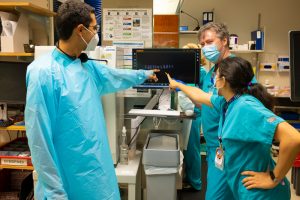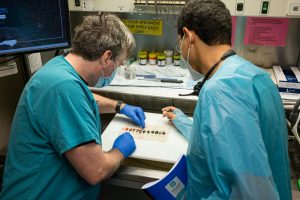Goals & Philosophy
 Provide a flexible, broad-based training program for physicians seeking training in Pathology for either an academic or community-practice career. Areas of study include Anatomic, Clinical, and experimental Pathology.
Provide a flexible, broad-based training program for physicians seeking training in Pathology for either an academic or community-practice career. Areas of study include Anatomic, Clinical, and experimental Pathology.- Residents are encouraged to participate in research projects of various kinds. Although no specific research requirement exists, it is felt that the problem-solving skills and methodologies learned through doing research are valuable tools for both the academic and community-practice pathologist.
- The Program will provide an educational experience sufficient to ensure that all residents develop competencies to the level expected of a new practitioner in the six areas listed below. The competencies listed below have been published by the Residency Review Committee (RRC) for Pathology of the Accreditation Council for Graduate Medical Education (ACGME).
- Patient care — residents must demonstrate a level of patient care that is compassionate, appropriate, and effective for the treatment of health problems and the promotion of health. Specifically, residents must demonstrate a satisfactory level of diagnostic competence and the ability to provide appropriate and effective consultation in the context of Pathology services.
 Medical knowledge — residents must demonstrate knowledge about established and evolving biomedical, clinical and cognate (e.g. epidemiological and social-behavioral) sciences and the application of this knowledge to Pathology.
Medical knowledge — residents must demonstrate knowledge about established and evolving biomedical, clinical and cognate (e.g. epidemiological and social-behavioral) sciences and the application of this knowledge to Pathology.- Practice-based learning and improvement — residents must be able to demonstrate the ability to investigate and evaluate their diagnostic and consultative practices, appraise and assimilate scientific evidence and improve their patient care practices.
- Interpersonal and communication skills — residents must be able to demonstrate interpersonal and communication skills that result in effective information exchange and teaming with other health care providers, patients, and patients’ families.
- Professionalism — residents must demonstrate a commitment to carrying out professional responsibilities, adherence to ethical principles, and sensitivity to a diverse patient population.
- Systems-based practice — residents must demonstrate an awareness and responsiveness to the larger context and system of health care and the ability to call on system resources to provide pathology services that are of optimal value.

